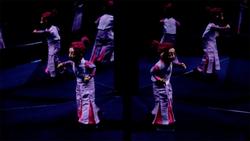Bachelor’s Program
The Film/Animation/Video (FAV) program cultivates the next generation of media makers, giving you opportunities to immerse yourself in a community that emphasizes curiosity, creative thinking, sociocultural awareness and critical dialogue. We encourage unique personal perspectives and experimentation, as you make work across and within three general approaches: animation, live-action, and open media.
Students in FAV develop an expressive language and professional skill set in moving images and sound. These fluencies enable you to communicate in diverse, thoughtful and innovative ways, sustain your practice and contribute to the future growth of your chosen profession.
Curriculum
Sophomores are introduced to the major through a series of short assignments designed to provide a basic technical foundation in film, video, animation and digital media. Skills are further developed the following year as juniors choose to specialize in live action, animation or open media while tackling more ambitious projects involving cinematography, lighting, sound design, character design, digital editing, compositing, producing, storyboarding and interactive programming.
Learning outcomes
Upon graduating, students majoring in FAV:
- demonstrate an understanding of the plasticity of time, by working with time as a material in film, animation and video. This includes methods of the discipline such as editing, pacing structures, camera movement, composition, sound, and picture relationships.
- demonstrate an understanding of the history and contemporary practice of film, animation and video.
- create works that demonstrate technical competence in the processes needed to create time-based media works.
- demonstrate ability to invent structures appropriate to their concept. Their work shows a marriage of concepts and execution choices.
- engage critically with their own projects, as well as the work of others, assessing assumptions made about the ideas or people represented and the implications and practical consequences of those assumptions.
- embrace experimentation and making as a form of research.
- have developed a multifaceted understanding of how meaning is constructed through narrative and non-narrative content.
- have discovered vital questions through their work that engage with and contribute to a wider community.
Student work

Cayla Gao BFA 2018

Elise Waldrow BFA 2019

Indy Dang BFA 2019

Cayla Gao BFA 2018

Savannah Barkley BFA 2017

Carillon Smith BFA 2018

Andre Prince-Gonzalez BFA 2018

Krissy Pelley BRDD 2019

Lila Mitchell BFA 2018

Selene Means BFA 2018

Hannah Kim BFA 2018

Ruth Han BFA 2018

Katie Falk BFA 2018 and Chantal Feitosa BFA 2018
Inspiring community
An in-demand department, FAV is home to approximately 150 undergraduate majors, with students from other disciplines often taking selected classes and offering different perspectives from the vantage point of their major disciplines. Juniors and seniors get the opportunity to screen finished films to a wider audience via popular spring film festivals open to the public. FAV faculty members offer a wide range of expertise in various areas and work closely with students to help them develop as strong, well-informed artists with the conceptual and aesthetic vision to reach well beyond a technical facility with film production.
Learning environment
FAV facilities offer production studios for film, video, 16mm, 35mm and puppet animation; digital editing and sound mixing rooms; and CGI and Macintosh workstations with a full range of professional production and editing software. But at RISD we go beyond teaching students how to use the latest technology. Instead, the idea is to master the use of tools by focusing on concepts, critical thinking and content development.
Degree project
In working on individual degree projects guided by faculty mentors, seniors need to meet the formidable challenge of conceiving of and producing a final live action or animated film. All films are screened at a public film festival held in May—and many go on to become award-winners in national and international festivals, helping students to establish their names after graduation.
Application requirements
Common Application
You’ll begin and manage your RISD application process by completing the Common Application. There is a nonrefundable application fee
Fee waiver
We want to make sure that application fees do not pose a barrier for any student. If you meet certain qualifications, you can request a Common Application fee waiver in one of the following two ways:
- Navigate to the "Fee Waiver" portion on the Common Application and select the option that most fits your family circumstances. This will allow you to submit your application without entering credit card information.
- If your situation does not match any of the Common Application’s waiver criteria, email admissions@risd.edu and we’ll process the waiver manually.
To receive a SlideRoom fee waiver, please email admissions@risd.edu.
Academic transcripts
Applicants must provide official transcripts of all secondary academic work through the most recent grading period. Your counselor may submit your transcript through the Common Application, Parchment, email or mail.
If your academic credentials are not written in English, they must be translated into English by an approved translator prior to submission.
Tests and test-optional
Test-Optional, SAT and ACT
We offer all applicants (domestic and international) the option to apply without submitting results from the SAT or ACT. You may opt into this process by selecting “test-optional” under the "Testing" portion of your RISD Common Application.
For students who choose to submit test scores, we will superscore your results, looking at your highest outcome across multiple test dates.
RISD’s institution code number for the SAT is 3726; for ACT the code number is 003812.
Transfer credits
You can use some Advanced Placement (AP), A-Level classes and International Baccalaureate (IB) credits toward RISD liberal arts requirements. First-year students can transfer a maximum of nine credits from AP courses with a score of 4 or 5, A-Level classes with an earned grade of C or higher or Higher Level IB scores of 5, 6 or 7. We will not accept AP or IB credit from art or studio classes.
VIEW OUR FULL TRANSFER CREDIT POLICY
English language proficiency tests
All applicants who speak English as a second language, including US citizens, must submit results from any one of these three options:
- TOEFL (Test of English as a Foreign Language)
- IELTS (International English Language Testing System)
- Duolingo (an online English test).
Since English proficiency is a prerequisite for acceptance, applicants are required to meet a minimum score of at least 93 on the TOEFL, a 6.5 on the IELTS or a 115 on Duolingo.
Plan to take the TOEFL or IELTS well in advance of the application deadline since it may take three weeks for your scores to be sent to RISD by the test agency. It may take up to four days for us to receive Duolingo test results.
The language test requirement may be waived for applicants who have completed their secondary education in an institution where English is the language of instruction. In addition, applicants must have three consecutive, full-time years of instruction without ESL, ELL or ENL courses. A waiver form can be found in the applicant portal and you can email the Admissions Office at admissions@risd.edu with any questions.
Portfolio
Portfolio submission
Your portfolio should present 12–20 examples of your most recent work showcasing your thinking and making. Once you've started your RISD application in the Common Application, you will be directed to the online platform SlideRoom to upload your portfolio.
What to include
The work you select should reflect a full range of your ideas, curiosity, experimentation and experience in creating and making. This can include work in any medium, in finished or sketch form, and can be the result of an assigned project or a self-directed exploration.
We strongly recommend that you include some examples that involve drawing and/or painting from direct observation (rather than from imagination, photograph or video). Since drawing and painting are fundamental tools for visual makers from initial concept to execution, it is valuable for reviewers to see examples of your experience with and approach to drawing.
While the majority of your portfolio should feature finished pieces, we suggest including some research or preparatory work in up to three—but no more than three—portfolio uploads/slides. This helps reviewers better understand how you develop your ideas.
Authenticity and documentation
The authenticity of the work in your portfolio is of great importance to the Admissions Committee. We will ask you to acknowledge that the work in your portfolio was conceptualized and created by you. In the case of collaborative work, we ask that you document your contributions and credit additional artists using the Additional Details field in SlideRoom.
We strongly discourage including excessive visual elements and text descriptions in a single slide submission. These are difficult to view and are likely to exceed the allowed submission limit.
You can submit additional angles or detail shots of some works across multiple slide submissions, combined into one composite including no more than three images, or in a single video upload. Editing is an important part of curating your portfolio. You may need to devise creative solutions to best show your work within the limits of submission guidelines.
We recommend the following file formats: jpeg, png, gif, mp4 and mov. These formats are most compatible with SlideRoom. We discourage Google Drive and zipped files.
You may be interested in attending or watching the recording of one of our portfolio tips webinars for more advice on how to approach your RISD application portfolio.
Artificial intelligence (AI)
RISD embraces the ethical use of artificial intelligence (AI) in the creative process. It is, however, important for the Admissions Committee to understand how and where AI was used. Any work supported or created by AI in your portfolio must include a description of your process and the tools you used in your making. We will ask you to acknowledge this within Slideroom.
College essay
RISD requires the Common Application personal essay (up to 650 words). You will find the writing prompts in the Writing section of the Common Application.
While we encourage you to adhere to the rules of good writing, we look for applicants who are not afraid to take risks in their expression. Please don't hesitate to use a writing style or method that may be outside the mainstream as you express a distinctive personal position in your essay.
Letter(s) of recommendation
Letters of recommendation can be very helpful to your application. One letter is required, although you may submit as many as three. Recommendation letters should be written by teachers or other professionals who have firsthand knowledge of your art or academic achievements and can comment on your potential as a student.
Please use the Common Application to invite your recommendation writers to submit letters through that service. Letters may also be emailed to admissions@risd.edu or sent directly to our mailing address (see “Submitting your materials” below).